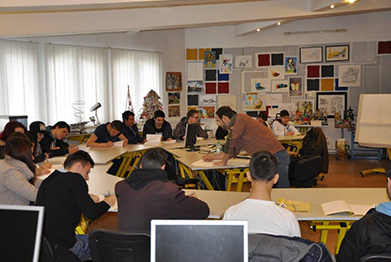Bachelor's degree

The study programme is certified EUR-ACE (details at https://eurace.enaee.eu/node/2384). The bachelor's degree field in which this study programme integrates is Industrial Engineering. The duration of studies is 4 years (240 ECTS credits). Students acquire integrated skills in the design and promotion of innovative and competitive products, by using specialized software and taking into account the rules of aesthetics and ergonomics; moreover, they acquire knowledge enabling them to quickly integrate the latest technological developments regarding the rational use and economy of raw materials and energy. This study programme is EUR-ACE certified, which ensures the European recognition of the engineer diploma.
Perspectives after graduation: Graduates can work in high-tech product design and development teams, in consulting companies within the field of industrial design, or they can open their own businesses in the fields of high-tech product development, implementation and maintenance.

The study programme EUR-ACE certified (details at https://eurace.enaee.eu/node/18214). The bachelor's degree field to which this study programme belongs is Industrial Engineering. The duration of studies is 4 years (240 ECTS credits). Students acquire integrated skills in the design and promotion of innovative and competitive products, by using specialized software and taking into account the rules of aesthetics and ergonomics; moreover, they acquire knowledge enabling them to quickly integrate the latest technological developments regarding the rational use and economy of raw materials and energy.
Perspectives after graduation: Graduates can work in high-tech product design and development teams, in consulting companies within the field of industrial design or they can open their own businesses in the fields of high-tech product development, implementation and maintenance.

The study programme is EUR-ACE labelled (Details at https://eurace.enaee.eu/node/78630). The bachelor’s degree field in which this study programme integrates is Industrial Engineering. The duration of studies is 4 years (240 ECTS credits). During their study years, students acquire skills in the design, planning and development of renewable energy conversion systems, as well as skills in the promotion and implementation of these systems in the built environment, in means of transport or in consumer products. Moreover, the study programme provides graduates with skills in entrepreneurship and consulting for the operation, maintenance and marketing of components and systems for the conversion of renewable energy.
Perspectives after graduation: To work as an engineer within teams of design, planning and development of systems based on the conversion of renewable energies, or as a specialist in consulting companies in the field of sustainable development. The study programme also provides graduates with skills in launching their own business in the field of design, implementation, management or marketing of renewable energy systems.

The study programme is EUR-ACE certified (Details at https://eurace.enaee.eu/node/22716). This study programme falls within the bachelor's degree field of Environmental Engineering. The duration of studies is 4 years (240 ECTS credits). During their study years, students acquire interdisciplinary skills enabling them, after graduation, to work in the design, implementation and management of depollution processes and technologies, as well as in the development of products with low environmental impact and in auditing production systems.
Perspectives after graduation: To work as an engineer in charge of environmental quality assurance in various production units; as an engineer in design teams or in production units of depollution equipment and installations; as an engineer responsible for environmental quality control within government structures and bodies.

The study programme is EUR-ACE certified (Details at https://eurace.enaee.eu/node/2386). This study programme belongs to the bachelor’s degree field of Mechatronics and Robotics. The duration of studies is 4 years (240 ECTS credits).
The mission of the Mechatronics study programme (MECHAnics + elecTRONIcs + Computer Science) is the future engineers’ interdisciplinary training in terms of principles and concrete ways to integrate mechanical engineering, electronics and software. Graduates must be able to design, plan, build, operate, maintain and troubleshoot mechatronic products and systems.
Students at the Mechatronics study programme acquire skills in Computer-aided design of mechanical subsystems (2D drawing, 3D modelling); Computer-aided design and implementation of electronic schemes within mechatronic systems (hardware); Design and development of software for mechatronic systems (assembly language and high-level programming languages), etc.
Perspectives after graduation: Continuing studies with master’s and doctoral programmes; Employment in multinational companies; To develop one’s own design and consulting companies in the mechatronic field.

The study programme is EUR-ACE certified (Details at https://eurace.enaee.eu/node/75646).The bachelor’s degree field which this study programme integrates in is Applied Engineering Sciences. The duration of studies is 4 years (240 ECTS credits). Students acquire skills in the use of optometric techniques and procedures for the evaluation, analysis and prescription of visual correction systems, visual training, maintenance and ergonomics of medical devices, computer-aided design of various optical correction systems and visual aids for the visually impaired, technological realization of the optical elements in the specific equipment. The completion of this study programme enables graduates to approach several activities and develop specializations in the field of optometry (evaluation, prescription, visual training, guidance, information, company management).
Perspectives after graduation: Medical-office optometrist, prescription processing optometrist, visual training optometrist (orthoptist), company manager, etc. The graduates of the Optometry study programme can work in medical optics units, ophthalmology and optometry offices, in companies producing lenses and spectacle frames, in medical units of Romania or EU countries.

The study programme is EUR-ACE certified (Details at https://eurace.enaee.eu/node/22722).This study programme falls within the bachelor’s degree field of Applied Engineering Sciences. The duration of studies is 4 years (240 ECTS credits). Students acquire skills in the design, manufacturing and management of prostheses and orthoses; design, manufacturing, maintenance and reliability of medical devices and systems; management and exploitation of biomedical systems; systems for assisting people with severe pathologies, for monitoring patients in surgery and intensive care or monitoring healthy people in aggressive environments on health.
Perspectives after graduation: Graduates of this specialism will have the necessary skills to work as a biomedical engineer in the public or private hospital sector, research and development engineer, production engineer, engineer in applicative fields, engineer in companies for the maintenance of medical and biological instruments and engineer for the management of health institutions.